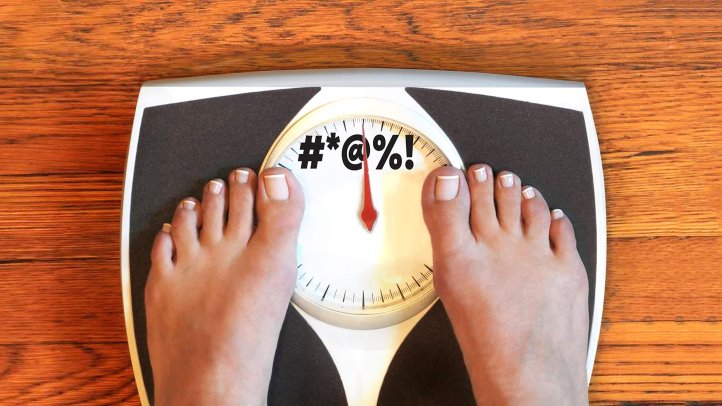
So how does Paxil cause weight gain? When you find out you need to take medication for the foreseeable future, the first thing that comes to mind is: How will this affect me? Will I gain weight? What side effects will it have? Thinking about the potential side effects of medications is natural, and we must do so.
Not only are these effects common with most medications, but they can also be harmful in many cases. The possibility of gaining weight is one of the most concerning side effects among new users of any drug.
While many people think that this means that every medication that causes weight gain must be unhealthy; However, this isn’t always the case. In fact, some types of drugs necessitate gaining weight as a positive result for optimum health.
So how does Paxil cause weight gain? Let’s take a closer look at what this drug does to your body and how it may help you in the long run.
Contents
Does Paxil cause weight gain?
Paxil (paroxetine) is an antidepressant medication that has been associated with weight gain in some individuals. To note is that weight gain is a common side effect of many antidepressant medications, including Paxil. SSRIs such as Paxil can cause a weight gain of 10 pounds or more when used in the long term. SSRIs are a type of drug used to treat depression. Some people may find that they experience an increased appetite and weight gain when taking this type of medication.
The exact mechanisms behind antidepressant-induced weight gain are not fully understood, but it is thought to be related to changes in appetite, metabolism, and other factors. Some research suggests that Paxil may be more likely to cause weight gain than other antidepressant medications, such as fluoxetine or bupropion.
However, it is important to note that not everyone who takes Paxil will experience weight gain. Weight gain may also be influenced by other factors, such as diet and exercise habits, underlying health conditions, and genetic factors.
While any drug that causes weight gain may seem like a bad thing at first, SSRIs have been shown to produce positive health outcomes in certain cases.
In some instances, the increased appetite and subsequent weight gain caused by these drugs are beneficial for people who are struggling with eating disorders or anxiety, or other mental illnesses.
In most cases, the side effects associated with SSRIs aren’t life-threatening either. As long as you notice them early enough and disengage from the drug if they don’t subside, there should be no problems with living your normal life while taking Paxil. If you keep up with your appointments and talk to your doctor about any concerns you have right away, everything should turn out just fine!

How Does Paxil Cause Weight Gain?
Paxil boosts appetite and also increases cravings for carbohydrates by increasing the amount of serotonin available in your brain. If you’re feeling down, it’s easy to turn to comfort foods for relief. Eating more carbs and sweets can lead to overeating, which in turn leads to weight gain. Paxil is designed to make you feel better, so it will increase your appetite and cravings for carbs.
This effect is also seen when taking other SSRIs. For example, you are likely to gain weight when taking Prozac due to an increase in serotonin levels in your body that causes increased appetite. Paxil may cause weight gain through various mechanisms, including:
- Metabolic changes: Antidepressants like Paxil can potentially affect the body’s metabolism, leading to changes in how calories are burned and stored. Some studies suggest that Paxil may slow down the metabolic rate, resulting in decreased calorie expenditure. The medication can cause metabolic changes that slow down the body’s ability to burn calories, such as decreased basal metabolic rate, decreased thermogenesis, and increased insulin resistance.
- Increased appetite: Certain antidepressants, including Paxil, have been associated with an increase in appetite. This can lead to a greater caloric intake, which, if not compensated by increased physical activity or dietary changes, may contribute to weight gain. Paxil can increase appetite and cravings for carbohydrates, which may lead to overeating and weight gain. Paxil is an antidepressant that functions by boosting appetite and also increasing cravings for carbohydrates. The reason this happens is that Paxil enhances your mood by making serotonin levels rise
- Carbohydrate cravings: Paxil and other SSRIs can affect the levels of serotonin, a neurotransmitter involved in mood regulation. Serotonin is also known to influence appetite and food cravings, particularly for carbohydrates. Increased cravings for carbohydrates and sweet foods could potentially contribute to weight gain.
- Fluid retention: Some individuals may experience fluid retention or edema as a side effect of Paxil. This can lead to temporary weight gain due to increased water retention.
- Hormonal changes: Paxil can alter the balance of hormones in the body, including cortisol and leptin, which may lead to weight gain.
- Sedation: Paxil can cause drowsiness and fatigue, which may lead to decreased physical activity and a more sedentary lifestyle, contributing to weight gain.
This can be helpful to some people as it becomes easier to eat a healthy diet while overcoming their depression. It may also help overcome weight loss resistance, which can happen when you’re trying to lose weight. However, if you don’t have any of these concerns, Paxil could lead to the opposite effect: weight gain.
Paxil is not the only drug that causes weight gain in some cases; many drugs do so. For example, birth control pills can cause weight gain because they contain estrogen and progesterone, which promote fat storage as well as slow down your metabolism so you burn less calories every day for energy.
Related: Can Paxil be Crushed?- Effects Of Crushing Paroxetine
Ways to prevent weight gain when taking Paxil
Paxil, a type of antidepressant, is typically prescribed to help ease depression symptoms. Paxil is also used to treat anxiety and obsessive-compulsive disorder. With all these uses, it’s no wonder that weight gain is one of the most common side effects of this medication.
Here are some tips that may be helpful in preventing weight gain when taking Paxil:
- Maintain a balanced diet: Focus on consuming a well-rounded diet that includes plenty of fruits, vegetables, lean proteins, whole grains, and healthy fats. Be mindful of portion sizes and try to limit your intake of high-calorie and processed foods.
- Monitor your calorie intake: Pay attention to your calorie consumption and ensure that you’re not exceeding your daily caloric needs. Keeping a food diary or using a calorie-tracking app can be helpful in maintaining awareness of your eating habits.
- Be mindful of snacking: If you notice an increased appetite or cravings while taking Paxil, be mindful of your snacking habits. Opt for healthier snacks such as fresh fruits, vegetables, nuts, or yogurt, and avoid sugary or high-calorie snacks.
- Stay physically active: Engage in regular physical activity to help maintain a healthy weight. Aim for at least 150 minutes of moderate-intensity aerobic exercise or 75 minutes of vigorous-intensity exercise each week, along with strength training exercises. Consult your healthcare provider before starting any new exercise regimen.
- Discuss dosage adjustments: If you’re experiencing significant weight gain or have concerns about it, consult your healthcare provider. They may consider adjusting your dosage or exploring alternative medications that have a lower likelihood of causing weight gain.
- Seek professional guidance: Consider consulting with a registered dietitian or nutritionist who can provide personalized guidance and support in managing your diet and weight while taking Paxil.
First, make sure that you are eating healthily and getting regular exercise. There are even drugs made specifically for treating weight issues that may be able to help your body maintain natural hormone levels so you won’t have any adverse effects like Paxil does. If you take any of these drugs or are concerned about your weight while on Paxil treatment, contact your doctor as soon as possible.
Pros of Taking Paxil
It might be easier to think of Paxil as a treatment for depression rather than a medication. For example, people who take Paxil often have fewer mood swings and episodes of depression. Another pro is that it’s the only drug on the market to treat panic disorders.
It can also help ease anxiety in many people. It doesn’t matter if you’ve never taken antidepressants before- Paxil has been proven to be just as effective as other drugs in this category.
Paxil is also known for its ability to lower obsessive-compulsive disorder-related urges and thoughts in some cases. The long list of benefits of taking Paxil can outweigh any potential side effects that come with it, like weight gain.

Cons of Taking Paxil for anxiety
While Paxil (paroxetine) is very effective in treating anxiety disorders, it’s important to be aware of potential drawbacks or cons associated with its use. Here are some cons to consider:
- Side effects: Like any medication, Paxil can cause side effects. Common side effects may include nausea, drowsiness, dizziness, sexual dysfunction, dry mouth, sweating, and gastrointestinal disturbances. It’s essential to discuss potential side effects with your healthcare provider and weigh the benefits against the potential drawbacks.
- Weight gain: As mentioned earlier, weight gain is a potential side effect of Paxil. Some individuals may experience significant weight gain while taking the medication. If weight gain is a concern for you, it’s important to discuss this with your healthcare provider, who can offer guidance on managing it.
- Withdrawal symptoms: Abruptly discontinuing Paxil or reducing the dosage too quickly can lead to withdrawal symptoms, commonly known as discontinuation syndrome. Symptoms may include flu-like symptoms, dizziness, agitation, irritability, insomnia, and electric shock-like sensations. It’s crucial to work with your healthcare provider to gradually taper off the medication when discontinuing Paxil.
- Drug interactions: Paxil can interact with other medications, including certain antidepressants, anticoagulants, antiplatelet drugs, nonsteroidal anti-inflammatory drugs (NSAIDs), and others. It’s important to inform your healthcare provider about all the medications you are taking to avoid potential drug interactions.
- Individual response: Not everyone responds to Paxil in the same way. While it may be effective for some individuals in managing anxiety, others may not experience the desired results or may find the side effects intolerable. Finding the right medication and dosage for anxiety can be a process of trial and error.
- Black box warning: Paxil carries a black box warning, the FDA’s most severe warning, regarding the increased risk of suicidal thoughts and behavior, particularly in children, adolescents, and young adults. It’s important to closely monitor any changes in mood or behavior while taking Paxil and inform your healthcare provider immediately if you experience any concerning symptoms.
Why do people gain weight on antidepressants?
Antidepressants have effects on serotonin, the neurotransmitter which is involved in the regulation of anxiety and mood while also controlling appetite, sleep, and digestion. Antidepressants can cause temporary weight gain as a side effect.
Paxil is an antidepressant that is notoriously known for its weight gain side effects. Some of the other side effects of Paxil are insomnia, headache, sexual dysfunction, nausea, increased sweating, and breast soreness or enlargement.
These side effects will come and go throughout the course of taking this drug and may vary from person to person. Weight gain from antidepressants is a temporary side effect and can be managed by eating healthy or exercising more often.
The concern around an increase in appetite on Paxil isn’t unfounded; however, studies have shown that these hunger pangs are reversible with time—so if you find yourself feeling hungry all the time while taking Paxil, just wait it out!
Does everyone gain weight on antidepressants?
Not everyone taking an antidepressant will gain weight. Some people may have no side effects at all. On the other hand, some people will experience a decrease in appetite which can lead to weight loss.
Some people only gain a few pounds and others gain 10 or more pounds. How does Paxil cause weight gain? When taking Paxil, it’s possible that you could have an increase in your appetite as well as an increase in serotonin levels.
This can lead to weight gain due to the higher calorie intake as well as the digestive issues that come with serotonin levels being too high. Why is this important? When pregnant women take Paxil, they are likely to give birth to babies that are heavier than average.
Related: Does Paxil Make You Sleepy or Tired?
Do anxiety meds cause weight gain?
A majority of patients on anxiety medication will experience weight gain partially and fully as one of the side effects. Paxil is one such medication. For many people, the weight gain associated with this drug is a welcome side effect.
Even for those that are not anxious, there are benefits to Paxil-induced weight gain because it allows the body to better regulate hormones and more easily absorb other medications. Anxiety is often an indicator of hormonal imbalance.
If you suffer from anxiety, then your body has been going through a degree of stress since you were a child (or maybe even as far back as infancy). This process can make it difficult for your body to produce enough hormones on its own without assistance.
In some cases, patients have been prescribed both Paxil and hormone treatments like Synthroid or estrogen in order to best treat their anxiety symptoms. The problem with relying solely on hormone treatments like Synthroid or estrogen is that they may not be effective if the patient’s anxiety levels have become too high over time.
This can lead to further health problems in the future, so doctors will prescribe anti-anxiety medications like Paxil in order to keep the patient’s physical health as stable as possible while also working on treating their mental health problems.
Paxil causes weight gain by preventing the production of serotonin which helps regulate appetite and mood levels among many other things. The addition of this medication will help bring your serotonin levels down so that your body can function properly again without stressful hormones running through it all day long. Paxil isn’t an unhealthy drug just
Does serotonin cause weight gain?
Yes, the hormone could be linked to weight gain, but there are many other factors to consider, including your diet and exercise habits. Serotonin is a neurotransmitter that acts as a mood stabilizer in the brain. When serotonin levels in the body become too low, you may experience depression or have trouble sleeping.
There are a few different medications that can help to regulate these levels of serotonin, such as Paxil. It’s possible that some people may gain weight while taking Paxil because this medication increases the production of serotonin in the brain, but it’s important to note that this is not always a possibility.
You also need to take into account any changes in your diet and exercise routines when you are on Paxil before determining if weight gain is caused by the medication.
Is weight gain from antidepressants permanent?
Paxil, also known as Paroxetine, is an antidepressant that can cause weight gain in some people. Paxil isn’t the only drug that causes weight gain, however. A number of other antidepressants such as Prozac, Cymbalta, and Ludiomil can also lead to weight gain in some users.
Weight gain from any medication is one of the most concerning side effects for many patients, and for good reason. If you take antidepressants and want to lose weight, then you may be able to do so after you stop taking Paxil.
The idea is that once you stop taking Paxil your body will return to its natural state and any additional weight gained during your time on the drug will disappear over time. In a study conducted by the University of Pennsylvania, it was found that those who took antidepressants were more likely to be overweight or obese than those who didn’t (37% vs 30%).
However, while these results are shocking they don’t prove that Paxil caused weight gain with all the participants. There are several other factors that play into gaining weight including age, socioeconomic status, and exercise habits; these factors could have just as easily led to this statistic.
If you are concerned about gaining weight due to Paxil use there are various steps you can take to prevent this from happening or keep your numbers under control: -Workout at least three times per week -Add more protein into your diet –
Does Paxil Cause Weight Loss?
Paxil causes weight loss in children and adolescents by decreasing appetite which is also seen when taking SSRI brands. It’s important to understand that Paxil is more likely to cause weight loss in children and adolescents than it is among adults.
This is because Paxil decreases appetite and as a result, people are less likely to eat. Decreased appetite can also lead to weight loss in adults, but this phenomenon is less common.
However, there haven’t been any studies done on the long-term effects of Paxil on weight loss; so we don’t know whether or not there will be any significant changes over time.
Does Paxil Cause Weight Gain? When you first start taking Paxil, your weight may increase rather quickly if you are someone who doesn’t usually eat a lot of food or if you are someone who eats a lot of junk food (and this will often be reflected in your BMI).
Eventually, though, most people find that their appetite decreases, which can lead to weight gain. Most people will gain about 5-10 pounds after being on the drug for six months; but again, this is less common among children and adolescents.
Conclusion
After researching Paxil, it appears that some of the most common side effects are weight gain and loss of appetite. The drug is intended to help with depression, and weight gain often occurs as a result of the medication’s anti-depression properties.
Weight gain is a good sign, as it suggests that the drug is doing its job in trying to stabilize your mood so you can feel better about yourself. However, it’s still important to remember that Paxil does have other side effects, so be sure to consult your doctor before starting any new medications.
As with any medication, Paxil has potential side effects. These can be both negative and positive. You may find that you experience weight gain as a result of taking this drug. However, this is not always the case. To understand how Paxil causes weight gain, we’ll need to take a look at what it does to your body in the first place.
Paxil can cause weight gain in some people because it raises appetite and lowers energy consumption. If you feel hungry more often and don’t have much energy to exercise, then you may end up gaining more weight than usual while taking this drug.
Another possibility for weight gain on Paxil is due to the effect of the drug on serotonin levels in the brain—it can reduce serotonin sensitivity which could lead to overeating or binge eating episodes on occasion. Lastly, some people react negatively to medications like Paxil by experiencing excessive thirst or frequent urination (diabetes).
FAQs
Do all people gain weight on antidepressants?
No, not all people gain weight on antidepressants. Weight gain as a side effect of antidepressant medication can vary among individuals, and some people may not experience significant changes in weight while taking them. However, weight gain is a possible side effect noted in a majority of antidepressants.
How much weight gain is normal on antidepressants?
The average weight gain that happens on antidepressants is 10 pounds or less. Only a quarter of people on antidepressants gain 10 pounds or more. This may not seem like a lot at first glance, but when it’s added to the weight you were already carrying this could mean trouble for your health.
Do you lose weight after stopping Paxil?
Weight loss after discontinuing Paxil can occur for some individuals, but it varies and depends on individual factors such as metabolism, lifestyle changes, and overall health. It may happen if you decrease your daily calorie intake as a result, or if depression comes back reducing your appetite markedly.
Which antidepressants cause rapid weight gain?
While weight gain can occur with various antidepressants, some medications that are commonly associated with rapid weight gain include certain tricyclic antidepressants (TCAs), such as amitriptyline and mirtazapine. Other antidepressants with the highest risk of weight gain include citalopram, nortriptyline, trimipramine, paroxetine, and phenelzine.

